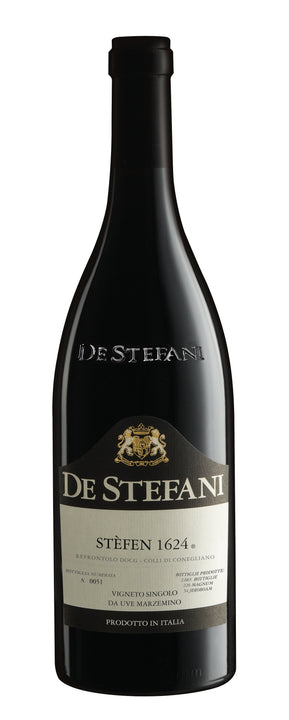DES1516RW
Stefen 1624
2016
Veneto
Certified Organic
Biodynamic farming
Wild yeasts
Low Sulphur
Vegan
Veneto has in recent time sadly become synonymous with the mass production of sparkling wine, light whites and thin reds: but this is far from the truth. Whilst Soave is the regions best white ambassador, Pinot Grigio steals most of the limelight, with reds made of Refosco, Corvina and Schioppettino perhaps not getting the praise they deserve. As the vineyards head away from Venice and up to the hills freshness, lower alcohol and delicate flavours are in abundance but a mix of the careful use of oak, recioto techniques (drying grapes) and seldom seem grapes are providing bolder, richer more powerful wines. Indigenous wines rule supreme here with c.18% of Italy’s DOC production, but with plenty of bottles at the other end too.
The De Stefani family’s winemaking tradition began in 1624 in Refrontolo, a village in the Conegliano Valdobbiadene UNESCO World Heritage site. In 1866, Valeriano De Stefani identified the area's unique terroir, a vision continued by his son and daughter-in-law, Valeriano and Angelina. In 1958, third-generation Tiziano De Stefani, a graduate of Italy’s top oenology school, expanded into the Piave Valley near Venice. This area, shaped by the Adriatic, the Dolomites and caranto soils (a blend of Alpine clay and minerals), gives the wines their distinctive character. Today, the estate is based in Fossalta di Piave. Now led by fourth-generation winemaker Alessandro De Stefani and his wife Chiara, the estate follows organic and biodynamic principles, cultivating old-vine native varieties like Marzemino and Raboso. Fermentation uses indigenous yeasts, and vinification is carried out without sulphites or preservatives—just a minimal amount of sulphur at bottling. The winery is carbon neutral and fully solar powered, with sustainability at its core.

Wine details
DES1516RW
De Stefani
Stefen 1624
2016
Veneto
Certified Organic
Biodynamic farming
Wild yeasts
Low Sulphur
Vegan
Veneto has in recent time sadly become synonymous with the mass production of sparkling wine, light whites and thin reds: but this is far from the truth. Whilst Soave is the regions best white ambassador, Pinot Grigio steals most of the limelight, with reds made of Refosco, Corvina and Schioppettino perhaps not getting the praise they deserve. As the vineyards head away from Venice and up to the hills freshness, lower alcohol and delicate flavours are in abundance but a mix of the careful use of oak, recioto techniques (drying grapes) and seldom seem grapes are providing bolder, richer more powerful wines. Indigenous wines rule supreme here with c.18% of Italy’s DOC production, but with plenty of bottles at the other end too.
The De Stefani family’s winemaking tradition began in 1624 in Refrontolo, a village in the Conegliano Valdobbiadene UNESCO World Heritage site. In 1866, Valeriano De Stefani identified the area's unique terroir, a vision continued by his son and daughter-in-law, Valeriano and Angelina. In 1958, third-generation Tiziano De Stefani, a graduate of Italy’s top oenology school, expanded into the Piave Valley near Venice. This area, shaped by the Adriatic, the Dolomites and caranto soils (a blend of Alpine clay and minerals), gives the wines their distinctive character. Today, the estate is based in Fossalta di Piave. Now led by fourth-generation winemaker Alessandro De Stefani and his wife Chiara, the estate follows organic and biodynamic principles, cultivating old-vine native varieties like Marzemino and Raboso. Fermentation uses indigenous yeasts, and vinification is carried out without sulphites or preservatives—just a minimal amount of sulphur at bottling. The winery is carbon neutral and fully solar powered, with sustainability at its core.
